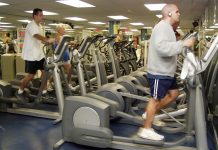
I workout a lot. From time to time during my workout, I get very light headed and notice I yawn a lot. What do you think?
I feel I have a good diet. I don’t eat fast food, fried food, or much junk food. I’m lactose intolerant, so I can’t drink milk. I don’t eat much red meat or much meat in general. I don’t take any vitamins currently, should I be taking a multivitamin, etc.?
Have you ever heard of Kombucha? I’ve been reading up on it through the Internet lately after seeing a special on holistic health wonders on Maury Povich. What do you think, if anything?
I also notice that I get tired (eyes sting) during work around 2:00 P.M.
I feel I get plenty of sleep, but I always have trouble getting up in the morning. Sometimes I have trouble getting to sleep at night, I sort of get a second wind around 11:00 P.M. Don’t you hate when that happens? Thanks for your time and effort in helping me out.
First I would suggest you talk to your doctor about lightheadedness during exercise as that is not normal. He/she is the appropriate person to assess your symptoms as it could be due to low blood pressure or lack of oxygen due to exercising too strenuously.
There were some interesting studies on yawning by math students in a class. The results were that students yawned a lot in math class because it improved oxygen availability to the brain while solving math problems. Could be that you’re not getting enough oxygen during your workout, especially since you get light headed.
Your workout may be anaerobic (without oxygen) rather than aerobic (with oxygen). I would suggest you talk to an exercise physiologist or certified trainer for suggestions on improving your workout routine. In the meantime, to determine if you are working too hard. Can you carry on a conversation while working out? If you don’t have enough oxygen to talk, you may not be delivering enough oxygen to your brain, which may be the cause of the light-headedness. Also body fat needs oxygen and carbohydrates to completely burn as fuel.
If you don’t consume 800 milligrams of calcium per day due to your milk lactose intolerance then you may need to take a calcium supplement.
Avoiding meat is OK, but do you include significant sources of iron and vegetable sources of protein in your food choices?
A multivitamin isn’t necessary if you eat a variety of foods and follow the suggested number of food group servings in the My Plate topic. However, since you are eliminating meat and dairy, you may be lacking in some essential nutrients iron and calcium.
Kombucha, a tea fermented with bacteria and yeast, has some health benefits according to published research. Initial 2-month fermentation, however, demonstrates a decrease in antioxidants the longer kombucha sits after fermenting. There also appears to be a great variability depending on how long the tea is fermented. The fermented tea can contain antioxidants resulting in anti-inflammatory effects, antimicrobial properties, and changing the gut microbiome (beneficial bacteria in the intestines) which changes within days of the foods you eat. People eat yogurt with active cultures to replenish the gut’s normal flora (microbiome) of helpful bacteria. However, one research suggests the metabolites of Kombucha may cause nerve degeneration in the brain. So not all good news. Sugar is often added to tea during the fermentation process to encourage bacterial and yeast growth much like in bread baking.
I would recommend you check someone’s credentials when they are making food recommendations. These recommendations should be based on research NOT testimonials from people who are using the product on TV programs.
Since your eyes sting mid-afternoon at work, do you work long hours at a computer or close work that could fatigue your eyes? I would suggest you see an ophthalmologist and have your eyes checked. There are exercises that you can learn to strengthen your eye muscles so that your eyes work together. Ask your eye doctor about the value of optometric vision therapy.
As to your tiredness upon waking and sleeplessness at bedtime, do you get at least 8 hours of sleep each night? You might want to eliminate any caffeine-containing foods (coffee, tea, cola, mountain dew, energy drinks, and chocolate) within 6 1/2 hours of bedtime. You may want to consider eliminating caffeine altogether and switching to caffeine-free beverages (decaf coffee, herbal tea, caffeine-free carbonated beverages) to improve your restful sleep.
Also, consider a sleep schedule where you go to bed at a specific time and wake at a specific time or even when you wake naturally. You may want to go to sleep before you get a second wind at 11 P.M.
Use of electronic devices like PC, tablets, and mobile phones can emit a blue light which may impair sleep. Look for a mobile device blue light filter app that you can set to activate a few hours before sleep and until you wake in the morning.
Have you tried melatonin supplement to aid sleep for short-term results? Melatonin is a hormone secreted by the pineal gland in your brain which helps you sleep. More is secreted after the sun sets and continues until the sun rises. Before electricity, people went to sleep when the sun set and woke when the sun rose. Farmers were a good example. Light reduces the production of melatonin which is why the use of electronic devices like tablets and mobile phone blue light reduces melatonin production at night. Many people take melatonin for jet-lag when traveling more than 2 time zones tho it is not intended to be used long term as it may increase blood glucose for people with diabetes and blood pressure for people with hypertension. Talk to your doctor first before using melatonin supplements short-term to get you back on a normal sleep schedule.


